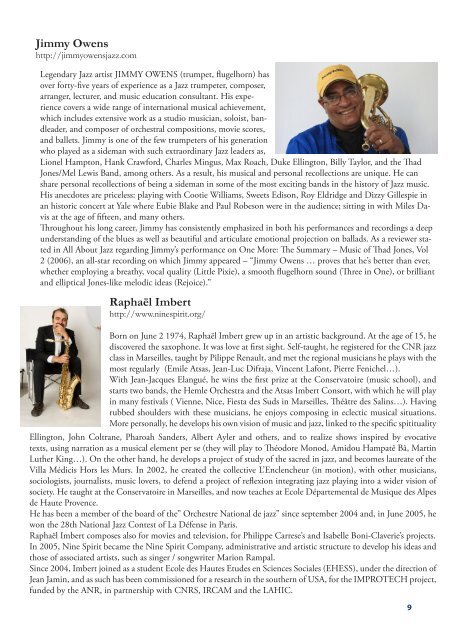Attica Blues Big Band, the project - Planete-Aurora
Attica Blues Big Band, the project - Planete-Aurora
Attica Blues Big Band, the project - Planete-Aurora
You also want an ePaper? Increase the reach of your titles
YUMPU automatically turns print PDFs into web optimized ePapers that Google loves.
Jimmy Owens<br />
http://jimmyowensjazz.com<br />
Legendary Jazz artist JIMMY OWENS (trumpet, flugelhorn) has<br />
over forty-five years of experience as a Jazz trumpeter, composer,<br />
arranger, lecturer, and music education consultant. His experience<br />
covers a wide range of international musical achievement,<br />
which includes extensive work as a studio musician, soloist, bandleader,<br />
and composer of orchestral compositions, movie scores,<br />
and ballets. Jimmy is one of <strong>the</strong> few trumpeters of his generation<br />
who played as a sideman with such extraordinary Jazz leaders as,<br />
Lionel Hampton, Hank Crawford, Charles Mingus, Max Roach, Duke Ellington, Billy Taylor, and <strong>the</strong> Thad<br />
Jones/Mel Lewis <strong>Band</strong>, among o<strong>the</strong>rs. As a result, his musical and personal recollections are unique. He can<br />
share personal recollections of being a sideman in some of <strong>the</strong> most exciting bands in <strong>the</strong> history of Jazz music.<br />
His anecdotes are priceless: playing with Cootie Williams, Sweets Edison, Roy Eldridge and Dizzy Gillespie in<br />
an historic concert at Yale where Eubie Blake and Paul Robeson were in <strong>the</strong> audience; sitting in with Miles Davis<br />
at <strong>the</strong> age of fifteen, and many o<strong>the</strong>rs.<br />
Throughout his long career, Jimmy has consistently emphasized in both his performances and recordings a deep<br />
understanding of <strong>the</strong> blues as well as beautiful and articulate emotional <strong>project</strong>ion on ballads. As a reviewer stated<br />
in All About Jazz regarding Jimmy’s performance on One More: The Summary – Music of Thad Jones, Vol<br />
2 (2006), an all-star recording on which Jimmy appeared – “Jimmy Owens … proves that he’s better than ever,<br />
whe<strong>the</strong>r employing a breathy, vocal quality (Little Pixie), a smooth flugelhorn sound (Three in One), or brilliant<br />
and elliptical Jones-like melodic ideas (Rejoice).”<br />
Raphaël Imbert<br />
http://www.ninespirit.org/<br />
Born on June 2 1974, Raphaël Imbert grew up in an artistic background. At <strong>the</strong> age of 15, he<br />
discovered <strong>the</strong> saxophone. It was love at first sight. Self-taught, he registered for <strong>the</strong> CNR jazz<br />
class in Marseilles, taught by Pilippe Renault, and met <strong>the</strong> regional musicians he plays with <strong>the</strong><br />
most regularly (Emile Atsas, Jean-Luc Difraja, Vincent Lafont, Pierre Fenichel…).<br />
With Jean-Jacques Elangué, he wins <strong>the</strong> first prize at <strong>the</strong> Conservatoire (music school), and<br />
starts two bands, <strong>the</strong> Hemle Orchestra and <strong>the</strong> Atsas Imbert Consort, with which he will play<br />
in many festivals ( Vienne, Nice, Fiesta des Suds in Marseilles, Théâtre des Salins…). Having<br />
rubbed shoulders with <strong>the</strong>se musicians, he enjoys composing in eclectic musical situations.<br />
More personally, he develops his own vision of music and jazz, linked to <strong>the</strong> specific spitituality<br />
Ellington, John Coltrane, Pharoah Sanders, Albert Ayler and o<strong>the</strong>rs, and to realize shows inspired by evocative<br />
texts, using narration as a musical element per se (<strong>the</strong>y will play to Théodore Monod, Amidou Hampatê Bâ, Martin<br />
Lu<strong>the</strong>r King…). On <strong>the</strong> o<strong>the</strong>r hand, he develops a <strong>project</strong> of study of <strong>the</strong> sacred in jazz, and becomes laureate of <strong>the</strong><br />
Villa Médicis Hors les Murs. In 2002, he created <strong>the</strong> collective L’Enclencheur (in motion), with o<strong>the</strong>r musicians,<br />
sociologists, journalists, music lovers, to defend a <strong>project</strong> of reflexion integrating jazz playing into a wider vision of<br />
society. He taught at <strong>the</strong> Conservatoire in Marseilles, and now teaches at Ecole Départemental de Musique des Alpes<br />
de Haute Provence.<br />
He has been a member of <strong>the</strong> board of <strong>the</strong>” Orchestre National de jazz” since september 2004 and, in June 2005, he<br />
won <strong>the</strong> 28th National Jazz Contest of La Défense in Paris.<br />
Raphaël Imbert composes also for movies and television, for Philippe Carrese’s and Isabelle Boni-Claverie’s <strong>project</strong>s.<br />
In 2005, Nine Spirit became <strong>the</strong> Nine Spirit Company, administrative and artistic structure to develop his ideas and<br />
those of associated artists, such as singer / songwriter Marion Rampal.<br />
Since 2004, Imbert joined as a student Ecole des Hautes Etudes en Sciences Sociales (EHESS), under <strong>the</strong> direction of<br />
Jean Jamin, and as such has been commissioned for a research in <strong>the</strong> sou<strong>the</strong>rn of USA, for <strong>the</strong> IMPROTECH <strong>project</strong>,<br />
funded by <strong>the</strong> ANR, in partnership with CNRS, IRCAM and <strong>the</strong> LAHIC.<br />
9


